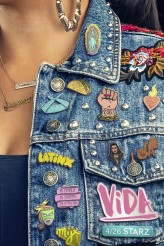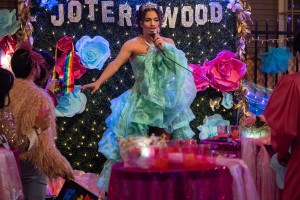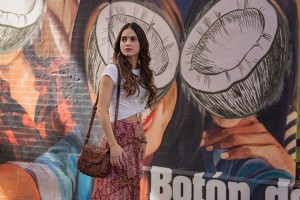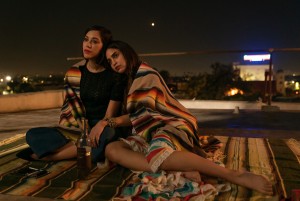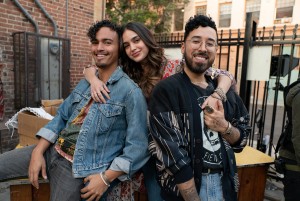
Melissa Barrera is Lyn, Curly Velasquez is Curly and Tonatiuh Elizarraraz is Marcos in VIDA | © 2019 Starz Entertainment, LLC/Kat Marcinowski
VIDA is now in its third and final season, Sunday nights on Starz. The series concerns disparate sisters Emma (Mishel Prada) and Lyn (Melissa Barrera), who inherit their late mother’s lesbian bar in East Los Angeles. After a lot of consideration, the siblings decide to reopen the bar, rename it Vida (after their mom Vidalia), and add live music. Other main characters: Vida’s widow Eddy (Ser Anzoategui), who has learned that not only was she not legally married to Vida, but that Vida’s ex-husband is still alive; neighborhood Latinx activist Mari (Chelsea Rendon), whose father has thrown her out of the house; Mari’s brother Johnny (Carlos Miranda), Lyn’s on-again, off-again lover who is a new father to a baby girl with his former fiancée Karla (Erica Soto); Nico (Roberta Colindrez), originally hired to help out at Vida and now Emma’s lover, who has managed to break through some of Emma’s self-protective personal barriers; Rudy (Adrian Gonzalez), Lyn’s new well-to-do flame, who’s a player in Los Angeles city politics.
Tanya Saracho created VIDA, and serves as show runner, along with being an executive producer, writer, and director on the series. She sat down with us in January to talk VIDA Season 3.
ASSIGNMENT X: Were you surprised or simply gratified when VIDA got picked up for Season 3?
TANYA SARACHO: So last year, I spun and spun, and made myself sick over, “Are we going to get a Season 3?” And then it happened, and I was like, “I’m going to promise myself that next season, I’m not going to do that again.” So I was just all the feelings. I don’t even have one answer. I was everything. I was nervous. I was like, “Will we get …?” I was anxious. And then when it came, it was such a relief. But a grand relief. And then it was just a joy to be able to work on it. [At the time of this interview, in January] I’m editing it right now, so I’m deeply in love with us right now. It’s like putting together a puzzle, and you consider each piece. So I’m in that love letter of putting together the final product. It’s so gorgeous. It’s such a good process. I have my post-production office – it’s all female, top to bottom, everybody, the post-production producer, everybody. My editors are all Hispanic, and it’s just me and two editors, and it’s a really intimate, amazing form of creation. I’m so in love with it right now. In fact, I haven’t talked to too many people but my editor, so right now, I’m in a little bit of whiplash [laughs].
We did one day that was eleven hours. [The editor] was like, “I’ve never sat with a director or a show runner for this long, and I was like, “We’re just creating magic!” [laughs] But also, the process. You have something to deliver, so that’s why. And I’m a perfectionist, so I go through every frame again. I directed half the season this season. I was there [on set], but I still have to go through every frame. I’m an overbearing mother, I guess, in that regard [laughs].
AX: When you were crafting VIDA Season 2, were you thinking, “Well, if we get a Season 3, I want to explore X, Y, and Z,” or was it just, “We got Season 3, and what did I put in Season 2 that can be expanded on?”
SARACHO: No. We had a lot of moments, like we planted the seed that the dad is alive in Season 2, and that was by design, that was much discussed. All the relationships, they’re meant to continue. So everything that happened in Season 2, all those threads are meant to continue. So you discuss the dream of, hopefully, getting another season so you can continue the story, so yes. Not everything, but a lot of things in Season 3 were dreamt up in Season 2.
AX: Can you tease the casting on the dad?
SARACHO: Yes. Jesse Borrego. He’s an icon in the Latinx film community. And also, we have a mom, by the way, Rudy’s mother. We get to see to see an amazing, battle-axe, rich Mexican mom, who doesn’t love Mexican-Americans. We cast Lidia Porto. She’s in GET SHORTY right now. She’s unbelievable. These two just make the season so rich, this dad and this mom, just generationally.
AX: Is this just the way the characters evolved, or did you always have the idea that at some point, Emma and Lyn were going to sort of slightly take on each other’s qualities? In Season 3 of VIDA, at least as it starts, it seems like Emma seems a little more – “laid-back” may be overstating it –
SARACHO: Yeah, she is more laid-back.
AX: And Lyn is much more organized.
SARACHO: We’re following the characters. We’re trying to organically follow them. So Season 1, we plant seeds, and then we pay them off Season 2. We’re doing the same thing. We’re just sort of following where we ended up. We ended up [Season 2] where they’ve connected, Emma is proud of Lyn, and Lyn has earned Emma’s respect, and Emma’s sort of handing that part [of managing the bar] off, or basically trusting her. So I love where we start now. Do we stay there? It’s VIDA. No. Maybe. Who knows? But the dad, the secret. This is a show about secrets, right? We started with a giant secret. And the mother, from the Great Beyond, still continues to affect these girls with the secrets. And here comes the dad to sort of throw a wrench into everything.
AX: Which came first, the desire to play with all different kinds of music, or the idea that Lyn would become the club’s entertainment manager?
SARACHO: It all sort of came together. I think when we finished first season, it was like, “You know, there’s a stage.” I forgot who said it in the writers’ room. “There’s a stage. Music.” So we sort of prepped Season 2 for that to be the thing, and Season 2 was for that Lyn. It was an emotional win for Emma to accept Nico, in the way she accepted her, to let go and put her walls down, but I feel like Lyn needed that win, the win that she sort of turned the bar around with her great idea, and booking these great acts. And I loved how we did the line-ups. This year, Lyn has a better idea. She starts the season bossing up. She’s kind of in charge, and is the one who makes things happen, whatever Lyn says. But she’s got all these game nights, and fancy DJs. She’s expanding on live acts. We have a drag king show. I’m so excited about that. Have you ever seen a drag king on TV? On TV, I’ve never seen drag kings like that. Lots of drag queens, but drag is usually –
AX: Yeah, drag is more thought of as men dressing as women than women dressing as men …
SARACHO: We have drag kings, and I’m crazy about just releasing it already. We also have a Queerceanera – not just a Quinceanera, it’s queer, and it’s a double Queerceanera. Someone’s turning thirty, and it’s gender-bendy, and just amazing. I really dig that episode, I’m so in love with it.
AX: Is the Queerceanera at the bar?
SARACHO: Yes. At the bar. They make use of the bar this season. And they make use of the parking lot, too. There’s an artisanal food night, which pisses off the neighborhood. Because these are vegan tacos – “What are you doing?” They’re like, “We have tacos right there on the street corner.” So the girls do misstep in that regard, but also, it helps them bring in patrons. So we have an amazing food night, and then the Queercinera happens out there, too. They use that parking lot a lot.
AX: Ser Anzoategui is non-binary, but their character Eddy is a lesbian.
SARACHO: Yes.
AX: Was there every any thought of making Eddy non-binary, or …?
SARACHO: There’s still talk.
AX: We know Vidalia sent Emma away as a teenager because she found out Emma was a lesbian. Wouldn’t Eddy being non-binary add another layer to Vidalia’s homophobia, if she thought, “Well, Eddy isn’t really a woman, so I’m not really a lesbian myself”?
SARACHO: I don’t think Vidalia was homophobic. She was trying to protect her daughter, because she didn’t want her [Emma] to be like her [Vidalia]. So it wasn’t homophobia, it was a little bit more complicated than that. It was self-hatred, and awareness and knowledge of the world. It was like, “This community will not welcome you if you are queer. Let me send you to Texas, with your grandmother.” So it was that, more than anything. But Eddy does get to experience a few moments as an object of desire, and we’ve never seen Eddy like that, and I love that about this season. I’m not saying if she leans into that or not, but we don’t see a lot of masculine-center butches be romantic. In a way, even though the wife [Vida] has been dead, that’s been the storyline here. That’s been the storyline here – “I [Eddy] am the wife.” And she’s been the heart of VIDA. But also, we’ve never given her a break [laughs]. She’s getting beat up, she’s homeless, she doesn’t have a job. So we’re rooting for poor Eddy. People keep asking me – it’s like, “Poor Eddy.” I know.
AX: Were you proud or concerned about actor availability with things like Mishel Prada going onto RIVERDALE, and Melissa Barrera being in the film IN THE HEIGHTS?
SARACHO: Yes, but I’m friends with [RIVERDALE creator/executive producer] Roberto Aguirre-Sacasa, and we actually talked about Mishel before, so we talked this out. And Mellie – how exciting – did you see that IN THE HEIGHTS trailer yet? It’s unbelievable. I think I saw it seven times in a row, and cried each time. I’m just so proud of her. I’m proud of both of them. And so yes, and also, Roberta is off to other shows, too. But that’s the point of something like this, giving people their start. We want them to fly. But they come back. They love the show.
AX: What is the time gap story-wise between the end of VIDA Season 2 and the start of Season 3?
SARACHO: One day. So what you saw is the same shirt that Nico was wearing in the last episode, because she hasn’t gone home.
AX: When you come back to VIDA at the beginning of a season and start up the writers’ room, does it feel like only one day has passed?
SARACHO: For me, it often does, because my writers are on other shows right now. I’m still in it. So every time that we’ve come back, I’ve had two weeks, three weeks in between seasons. Basically, I’m with it most of the year, because I’m editing, and on production stuff. So for me, it does [feel like a very short period of time between seasons]. They have to get back into it. And also, it’s a different process. A lot of the writers are not on set. The producer/writers are. But [the writers who aren’t producers] write it, go away, and then they see it on TV, and they’re like, “That’s what we wrote? Oh, my God, that’s what it looks like.” It’s always fuller.
AX: Not asking for Season 3 spoilers, but from VIDA Seasons 1 and 2, do you have favorite scenes or favorite episodes?
SARACHO: That’s really hard, because I love all of it. I have an affinity for, and a certain care for, the “baby queer” conversation of the third episode of last season, because that happens to me all the time. Everything Emma was saying, that conversation, where my community has taken me on like that, like policed me, that’s very real to me [laughs]. I love the character of Nico so much. Nico showed up, and it was like, “Ahh …” So the eighth episode [of Season 2], when they go off to that crazy party, is just really magical to me, and there’s something like that this season. It’s more complicated, but it’s like that, and I just love [the relationship of Emma and Nico]. And Lyn and Johnny, they’re a complicated couple. Or not-couple. Pair. But the chemistry between those two actors, I just like them together. But yeah. It’s hard to say, because I love us. Also, I’m really proud of that sex scene in the last episode between Emma and Nico, because I shot it as a director, I wrote it as a writer, but also, I workshopped it with them, we talked about it. It was not about sex, it was about Emma bringing down her defenses and letting herself be open. And I was so proud of it. A queer d.p. did it, a queer first a.d., a queer second a.d. It was a very queer moment, and it turned out, I’m very proud of it.
AX: Since VIDA started, a lot of other productions have begun shooting in East Los Angeles, like GENTEFIED, DEPUTY …
SARACHO: Yes. But we didn’t have the same production schedules. They were already editing while we were barely shooting. We haven’t overlapped. I’m so excited about GENTEFIED [which is also about the Latinx community in East Los Angeles]. I love the creators [Linda Yvette Chavez and Marvin Lemus]. They’re lovely, brilliant people. Because they were originally a Web series, I saw it all already. It’s so good. No, we never overlapped with them, but [VIDA production overlapped with] SWAT. On Season 2, Johnny and Lyn were having a sex scene on a rooftop, and there was a car chase, and we had to keep holding for the car chase [laughs]. That was SWAT. I have to tell Aaron Thomas, who’s [SWAT’s show runner and co-creator], “You know, your car chase was messing with our sex scene.”
AX: Do you have any new locations that you’re using in VIDA Season 3?
SARACHO: Yeah. You’re going to see Rudy’s mother’s palatial home. It’s gorgeous, and I love that we’re dealing with that. We’re going to see that, we’re going to be in Hollenbeck Park more, which is in Boyle Heights. We’re going to get to see other parts of the neighborhood [that we haven’t] seen before. Our show is about the people in the neighborhood, so their lives are very insular. So we’re not leaving – [in previous seasons], Lyn, especially, goes off to find whiteness [laughs]. But this season, she’s in with Rudy, so she’s down [with the neighborhood], she’s really down, and she’s really excited about being a trophy girlfriend. She loves the role.
AX: Now, is there is a bit of a romantic triangle there? Because it seems like Lyn’s got something kind of unique with Johnny …
SARACHO: You have to wait and see. Johnny goes through a big trauma. And also, he’s a new dad. So he’s distracted. And it’s beautiful to see that Lyn respects that. And you see them as a more grown-up relationship. And also as friends for the first time. In Season 3, it’s like, “Wait. That’s what that looks like? Friendship?” It’s kind of powerful.
AX: Are there any things in the real world that have affected VIDA at all, that you’ve wanted to put into the show, or …?
SARACHO: We finally are dealing with immigration. We just needed to get to know the characters. It had to be organic. It couldn’t be just because they expect every Latinx show to touch on it. No. We had to do it the right way. It’s kind of pulled from – I’m not going to say “headlines,” I’m going to say citizen witnesses. And it’s powerful. When I was editing it, I was like, “Oh, man …” But we were always going to deal with this. Immigration has always been embedded in everything we do, because everybody’s different status – Yoli is DACA, that kind of thing – but now we deal with it. So it’s something I’m anxious to put out there.
AX: What would you most like people to know about VIDA Season 3?
SARACHO: That the story, the complications, the depth, it continues. And it continues that narrative that we exist in a very complicated way, but we exist.
This interview was conducted during Starz’s portion of the Winter 2020 Television Critics Association (TCA) press tour.
Related: VIDA: Exclusive interview with stars Melissa Barrera and Mishel Prada on the final season
Related: VIDA: Exclusive interview with creator Tanya Saracho on Season 2
Related: VIDA: Exclusive interview with creator Tanya Saracho on Season 1 of new Starz comedy
Follow us on Twitter at ASSIGNMENT X
Like us on Facebook at ASSIGNMENT X
Article Source: Assignment X
Article: VIDA: Exclusive interview with VIDA creator Tanya Saracho on the third and final season of the Starz drama
Related Posts:




